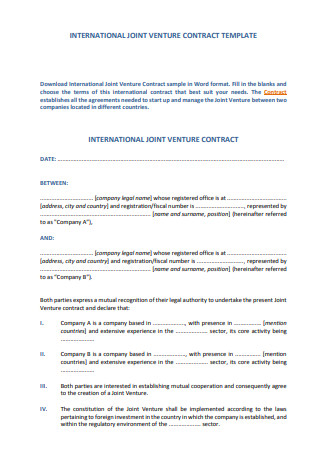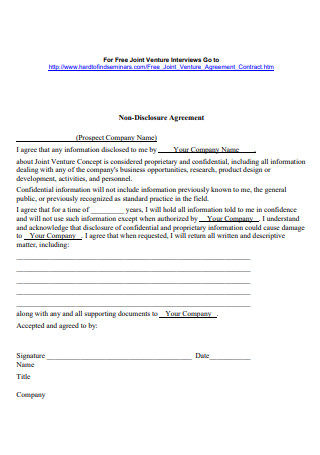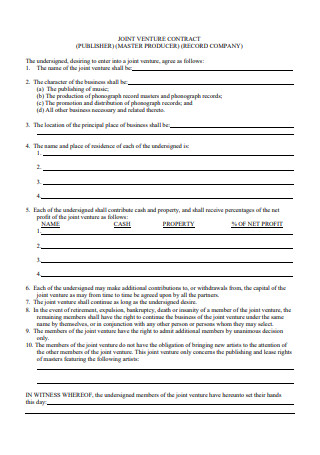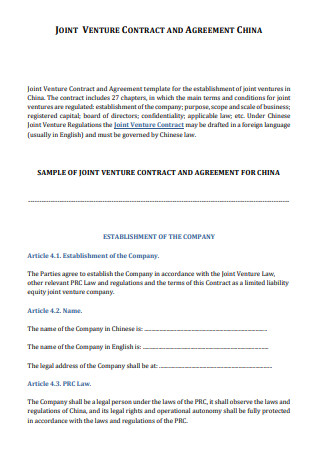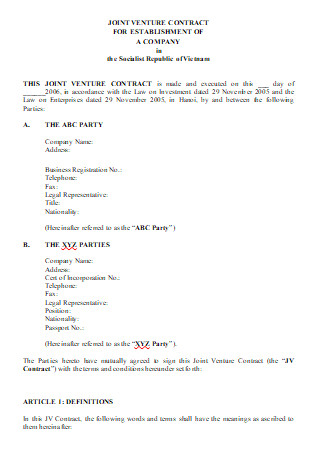4+ Sample Joint Venture Contract
In this article, we will be discussing what a Joint Venture Contract is and how business entities agree to prepare one. With the samples we have prepared, you can start drafting one of your own or get familiar with the terms and clauses so that you can be made aware of what to look forward to when you are presented with one.
What is a Joint Venture Contract?
A joint venture contract is a written legal document that establishes the terms and conditions the parties involved in the joint venture are obliged to commit. Moreover, it instructs the business parties of what they must be able to do, how they should perform, and what they are prohibited from doing otherwise, penalties will have to be incurred and it could usually be in the form of fees. The contract shall also outline the contributions that shall be made in order to meet the established expectations. Securing a joint venture contract will govern the operational plans that the parties can employ which in turn would allow them to better control the direction of the business venture and reassure them of what can be done.
An important item of a joint venture contract like most contracts is the length that the contract will take effect since a joint venture only lasts for a certain period of time or until a project is completed.
When is a Joint Venture Appropriate?
A Joint Venture (JV) is a business agreement embarked by two or more businesses cooperating together for a common goal of pursuing a new project. Cooperation here could entail sharing assets, resources, property, knowledge, skills and experience in order to undertake a specific goal for a certain period of time that is mutually beneficial to the business entities involved. Most joint ventures are formed when there is an intent to break into a foreign market or combine two or more parties’ performance.
It is not to be confused with a business partnership although they are similar in many ways and especially since a joint venture can be considered as a kind of partnership. The main distinction lies with the duration of the collaboration since a joint venture is only a temporary partnership intended for a single purpose whereas a partnership engages in business continuity and can usually last for many years.
But when exactly can a business say they need to collaborate with other business entities? We list some of the most common reasons why embarking on a joint venture is an option taken by businesses.
1. It gives you access to new markets.
Forming alliances with other business companies can expand your reach to a newer and more diversified market. If not a new market, it still can expand your business to the same market you are targeting but could not reach due to the limited resources your business could allocate for marketing. Especially if the joint venture is successfully completed, this could produce recognition that small to medium sized companies could definitely benefit from when they’re working with larger companies. Networking in the business industry is incredibly important so to be associated with an established business company and having participated in a collaborative project can definitely gain you a few nods and potential projects that can further boost your business’ reputation giving you access to newer and more expansive markets.
2. Resources are combined.
If your business company is low on resources or is in need of other means to garner a specific kind of resource that your company does not necessarily specialize on, a joint venture can be advantageous for you as all the parties involved can pool their resources with the intention of accomplishing the task. In the same manner, your co-venturers could be looking into your company to supply the resources that they need.
Resources that can be agreed by both parties to share can include but are not limited to capital, personnel, equipment, facilities or intellectual property such as trademarks and patents. When resources are pooled this way, this allows the business partners involved to profit from the project.
3. It shares specialized knowledge and expertise.
The same way that a joint venture can aid in supplying the resources that one business lacks, knowledge and expertise can also be shared when the businesses enter into a joint venture agreement. Most companies do not necessarily excel in everything although they are and they should be able to perform competently in certain aspects. It’s this reason that forces companies to commit to a joint venture because more often than not, one lacks the required expertise and knowledge so for every lacking department, the co-venturer can make up for and vice-versa.
4. It reduces costs.
A lot of the things that have to do with a joint venture are shared and this includes the sharing of marketing, product development and other expenses. This in turn reduces the need to spend excessive costs and a large capital to invest in and therefore reduces the financial burden of having to bear all the financial expenditures on your own.
Other reasons for business organizations to collaborate albeit temporarily can include aspirations for business expansions, research and development of new products, services or advance existing technologies that require the special expertise of another, and entering into a foreign market. A salient aspect of this business arrangement that makes it an appealing path to take is that all parties involved contribute to the completion of the project while retaining legal independence and share ownership of project’s assets, liabilities, opportunities and risks.
What is Needed in a Joint Venture?
A basic need to enter into a joint venture is of course, finding the right partners who you are assured will commit to the agreement and ultimately in the completion of the project. Narrow down prospective co-venturers in terms of the expertise or knowledge that the project is in need of. Reach out to business owners and distributors who you have evaluated and conducted a separate research and analysis on. Other than that, we list down the following:
1. A clearly defined objective.
One risk of joint ventures that is enough to discourage businesses to enter into one is its probability of ending badly resulting in a waste of time, effort, resources, and money. However, if a company were to prepare a business proposal that clearly describes what the project is about and elaborately establish its overall objective while defining as well the important highlights in the proposal, companies can estimate better the opportunities and risks they are likely to sacrifice and garner and if it’s something their own companies can benefit from.
2. Understanding the appropriate joint venture type.
Nibusinessinfo.co.uk lists down three types of joint venture that they posit to rely on the kind of business you are trying to achieve. They go on to mention the importance of preparing a legal agreement which in this case is a joining venture agreement that will protect your business should you push through with the joint venture arrangement. The three types of joint venture are:
3. Establishing a Joint Venture Contract
If you are planning to draft a joint venture agreement that your co-venturers can agree upon and move forward with the contract, you can start with the most basic stuff such as listing down some basic terms you wish to propose in the agreement. And then you can proceed with including the following components:
FAQs
What is a Joint Venture Contract?
A Joint Venture Contract is an agreement made by two or more business entities who will be working together for a business project. Like most contracts, it details the terms and conditions including the prohibited acts that all parties should oblige throughout the duration of the contract.
What Should be in a Joint Venture Agreement?
A joint venture agreement should include the terms, expectations, responsibilities, objectives, and the plans that must be compiled by willing parties for the business project. It also has to include the length that the joint venture agreement will be in effect. In reference to what was written in the article, a joint venture agreement can also include the following:
- Parties Involved
- Description of the Joint Venture
- Objective and Scope of the Joint Venture
- Financial Agreements
- Duration of the Contract
- Contributions
- Personnel
- Conflict Settlements and Resolutions
- Termination of Contract
- Non-disclosure Agreement
Are Joint Ventures a Good Idea?
Joint Ventures are agreements that are entered by most businesses who want a quicker way to expand and diversify their market as working together with a business with a specific target market can help with the engagement and fulfill this need of your business. In addition to gaining access to a new market, a lot of things are also shared between you and your co-venturers such as resources, expertise, costs and knowledge that can be beneficial for most small companies who have not established a strong foundation to know its strongest suit or obtain revenues to cover operations.

